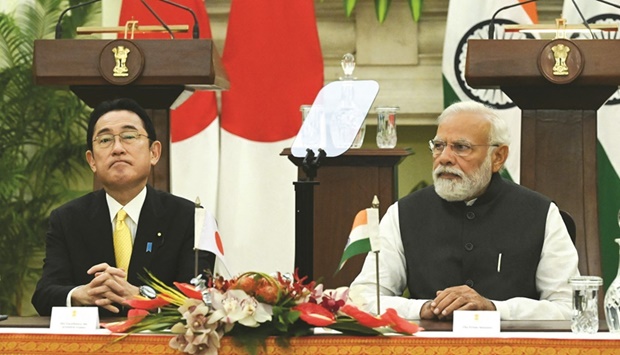Japanese Prime Minister Fumio Kishida urged India’s Narendra Modi yesterday to take a tougher line on Russia’s invasion of Ukraine, but a joint statement after talks in Delhi fell short of condemning Moscow’s actions. Unlike fellow members of the Quad alliance — Japan, Australia and the United States — India has abstained in UN votes deploring Russia’s actions, calling only for a halt to the violence while still buying Russian oil.
Kishida told a joint news conference that he and Modi held an “in-depth discussion” and that “Russia’s invasion... shakes the very foundations of the international order and must be dealt with firmly.”
But Modi made no direct mention of Ukraine and their joint written statement afterwards called only “for an immediate cessation of violence and noted that there was no other choice but the path of dialogue and diplomacy for resolution of the conflict”.
Without naming any country, they “emphasised the need for all countries to seek peaceful resolution of disputes in accordance with international law without resorting to threat or use of force or any attempt to unilaterally change the status quo”.
Earlier this month in a four-way call, the other Quad leaders — Kishida, US President Joe Biden and Australia’s Scott Morrison — also failed to win the Indian premier over to their position on Ukraine. A joint Quad statement at the time said they “discussed the ongoing conflict and humanitarian crisis in Ukraine and assessed its broader implications” — without any condemnation of Moscow.
A separate Indian readout pointedly underlined that the alliance must remain focused on its “core objective... in the Indo-Pacific region” of promoting peace, stability and prosperity.
Modi and Morrison are also due to hold a virtual summit tomorrow focused on trade, when the Australian premier may again press his Indian counterpart to fall more into the Western camp over Ukraine.
Russia has been India’s main arms supplier since the Soviet era, but today Delhi also needs more support from the Quad and others in the region and beyond in the face of an increasingly assertive China.

India’s Prime Minister Narendra Modi and Japan’s Prime Minister Fumio Kishida wait to sign an agreement after their meeting in New Delhi yesterday.
